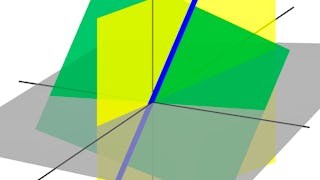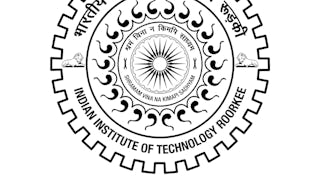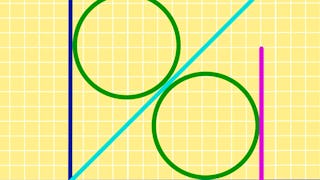This is the third and final course in the Linear Algebra Specialization that focuses on the theory and computations that arise from working with orthogonal vectors. This includes the study of orthogonal transformation, orthogonal bases, and orthogonal transformations. The course culminates in the theory of symmetric matrices, linking the algebraic properties with their corresponding geometric equivalences. These matrices arise more often in applications than any other class of matrices.



Linear Algebra: Orthogonality and Diagonalization
Ce cours fait partie de Spécialisation Linear Algebra from Elementary to Advanced

Instructeur : Joseph W. Cutrone, PhD
Enseignant de premier plan
1 893 déjà inscrits
Inclus avec 
(33 avis)
Détails à connaître

Ajouter à votre profil LinkedIn
11 devoirs
Découvrez comment les employés des entreprises prestigieuses maîtrisent des compétences recherchées

Élaborez votre expertise du sujet
- Apprenez de nouveaux concepts auprès d'experts du secteur
- Acquérez une compréhension de base d'un sujet ou d'un outil
- Développez des compétences professionnelles avec des projets pratiques
- Obtenez un certificat professionnel partageable


Obtenez un certificat professionnel
Ajoutez cette qualification à votre profil LinkedIn ou à votre CV
Partagez-le sur les réseaux sociaux et dans votre évaluation de performance

Il y a 4 modules dans ce cours
In this module, we define a new operation on vectors called the dot product. This operation is a function that returns a scalar related to the angle between the vectors, distance between vectors, and length of vectors. After working through the theory and examples, we hone in on both unit (length one) and orthogonal (perpendicular) vectors. These special vectors will be pivotal in our course as we start to define linear transformations and special matrices that use only these vectors.
Inclus
2 vidéos2 lectures3 devoirs
In this module we will study the special type of transformation called the orthogonal projection. We have already seen the formula for the orthogonal projection onto a line so now we generalize the formula to the case of projection onto any subspace W. The formula will require basis vectors that are both orthogonal and normalize and we show, using the Gram-Schmidt Process, how to meet these requirements given any non-empty basis.
Inclus
3 vidéos3 lectures4 devoirs
In this module we look to diagonalize symmetric matrices. The symmetry displayed in the matrix A turns out to force a beautiful relationship between the eigenspaces. The corresponding eigenspaces turn out to be mutually orthogonal. After normalizing, these orthogonal eigenvectors give a very special basis of R^n with extremely useful applications to data science, machine learning, and image processing. We introduce the notion of quadratic forms, special functions of degree two on vectors , which use symmetric matrices in their definition. Quadratic forms are then completely classified based on the properties of their eigenvalues.
Inclus
2 vidéos2 lectures3 devoirs
Inclus
1 devoir
Instructeur

Offert par
Recommandé si vous êtes intéressé(e) par Machine Learning


Johns Hopkins University


Johns Hopkins University


IIT Roorkee


The University of Sydney
Pour quelles raisons les étudiants sur Coursera nous choisissent-ils pour leur carrière ?




Avis des étudiants
33 avis
- 5 stars
91,17 %
- 4 stars
8,82 %
- 3 stars
0 %
- 2 stars
0 %
- 1 star
0 %
Affichage de 3 sur 33
Révisé le 8 déc. 2024
Teach good. It explore some of my blind areas about diagonalization, eigen and orthogonal, repeated roots concern, etc.
Révisé le 4 nov. 2024
It is great, the guy on the videos knows a lot, its a pity he writes so fast :))


Ouvrez de nouvelles portes avec Coursera Plus
Accès illimité à 10,000+ cours de niveau international, projets pratiques et programmes de certification prêts à l'emploi - tous inclus dans votre abonnement.

Faites progresser votre carrière avec un diplôme en ligne
Obtenez un diplôme auprès d’universités de renommée mondiale - 100 % en ligne

Rejoignez plus de 3 400 entreprises mondiales qui ont choisi Coursera pour les affaires
Améliorez les compétences de vos employés pour exceller dans l’économie numérique
Foire Aux Questions
Access to lectures and assignments depends on your type of enrollment. If you take a course in audit mode, you will be able to see most course materials for free. To access graded assignments and to earn a Certificate, you will need to purchase the Certificate experience, during or after your audit. If you don't see the audit option:
The course may not offer an audit option. You can try a Free Trial instead, or apply for Financial Aid.
The course may offer 'Full Course, No Certificate' instead. This option lets you see all course materials, submit required assessments, and get a final grade. This also means that you will not be able to purchase a Certificate experience.
When you enroll in the course, you get access to all of the courses in the Specialization, and you earn a certificate when you complete the work. Your electronic Certificate will be added to your Accomplishments page - from there, you can print your Certificate or add it to your LinkedIn profile. If you only want to read and view the course content, you can audit the course for free.
If you subscribed, you get a 7-day free trial during which you can cancel at no penalty. After that, we don’t give refunds, but you can cancel your subscription at any time. See our full refund policy.

